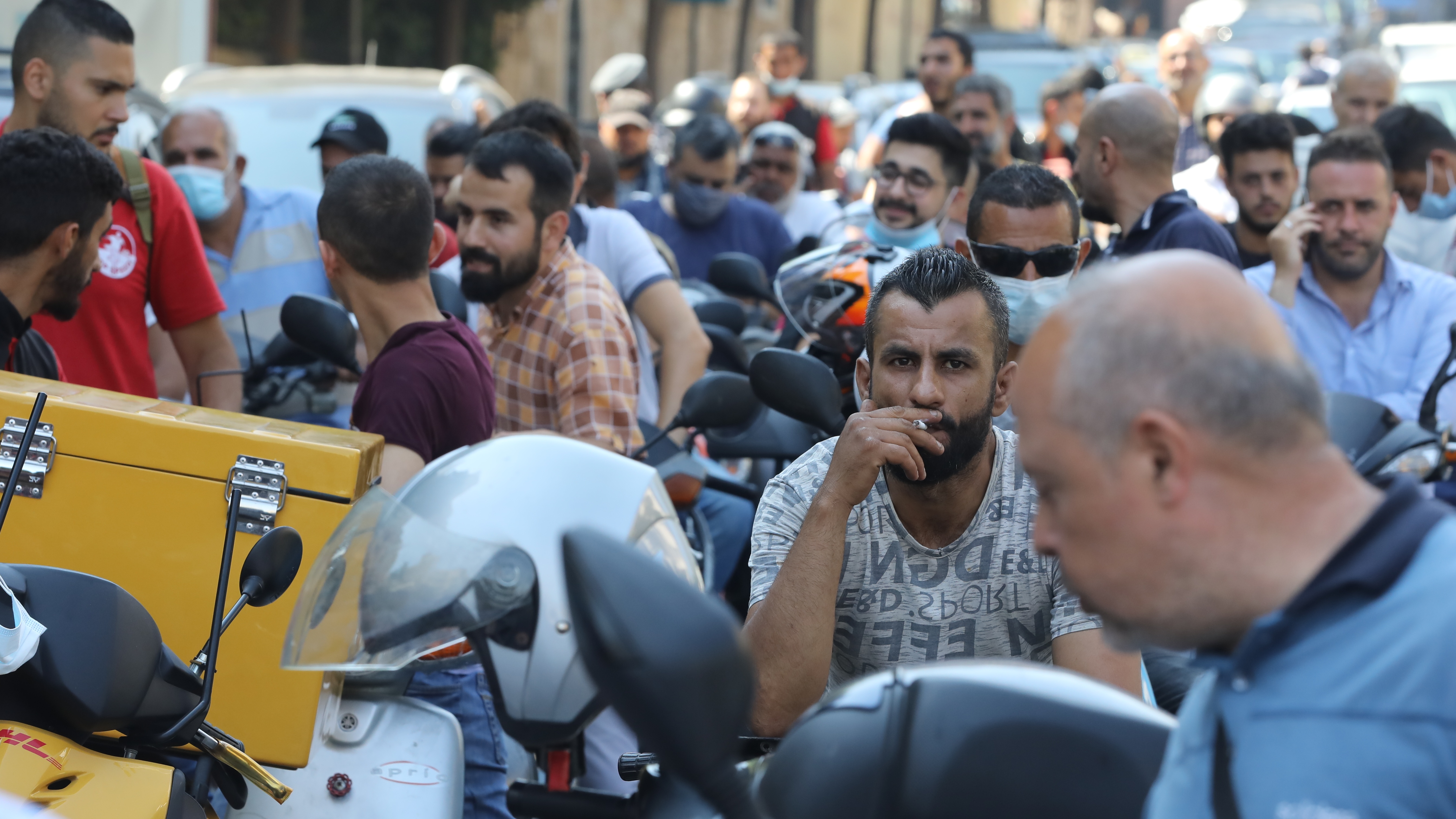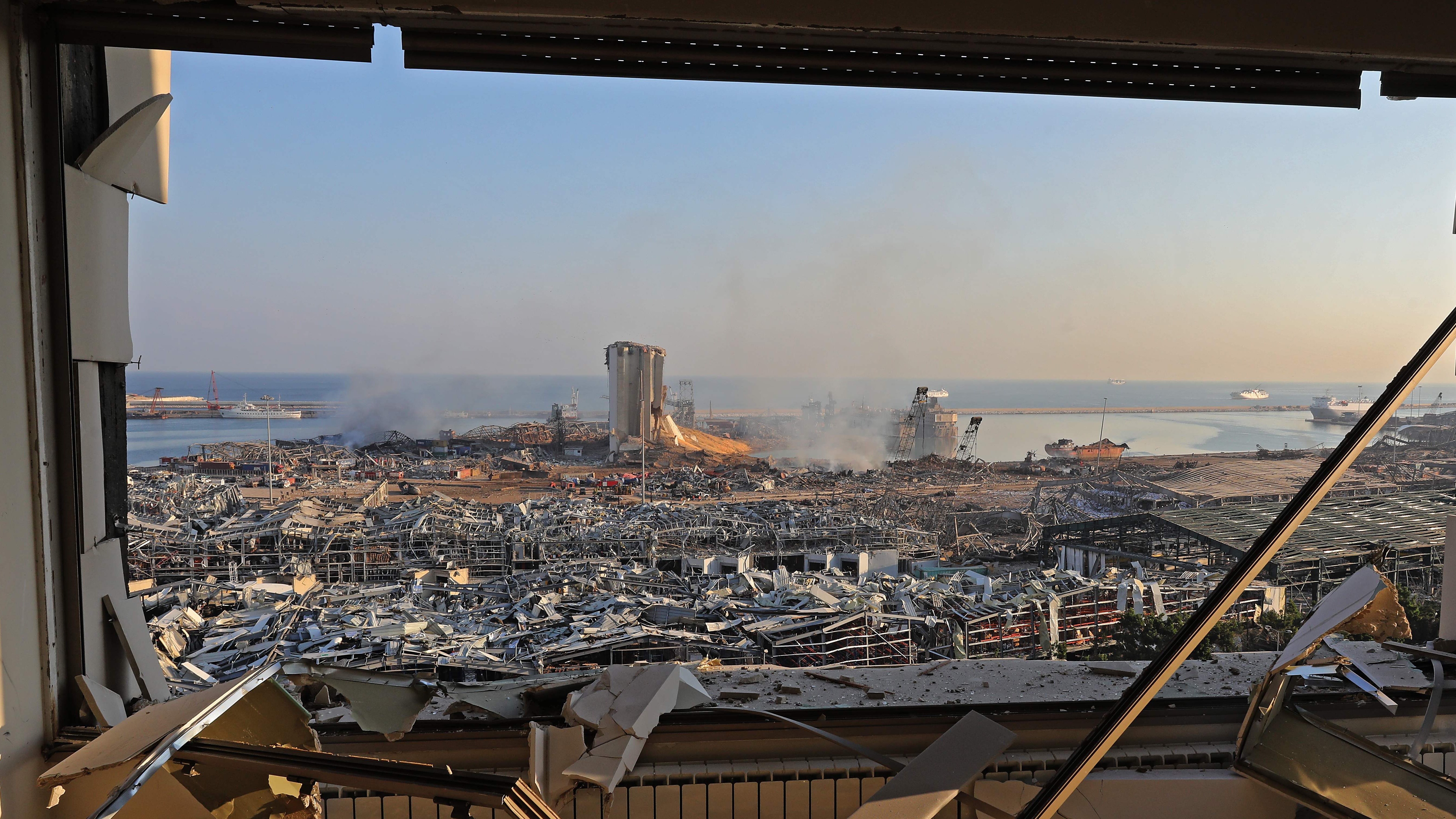Lebanon on brink of breakdown as financial crisis escalates
Hyperinflation has triggered ‘disastrous’ shortages of medicines and fuel

A free daily email with the biggest news stories of the day – and the best features from TheWeek.com
You are now subscribed
Your newsletter sign-up was successful
Lebanon’s caretaker prime minister is calling on the international community to intervene in an economic crisis that he warns has left his country just days away from a “social explosion”.
More than half of the Lebanese population are living in poverty as a result of one of the worst economic depressions in modern history, according to the World Bank. The Lebanese pound has lost almost 90% of its value in the past 18 months, amid crippling shortages of medicine, fuel and electricity.
And “the Lebanese are facing this dark fate alone”, PM Hassan Diab told a meeting in Beirut yesterday of ambassadors and representatives of diplomatic missions.
The Week
Escape your echo chamber. Get the facts behind the news, plus analysis from multiple perspectives.

Sign up for The Week's Free Newsletters
From our morning news briefing to a weekly Good News Newsletter, get the best of The Week delivered directly to your inbox.
From our morning news briefing to a weekly Good News Newsletter, get the best of The Week delivered directly to your inbox.
‘Pity the nation’
Diab has been serving as caretaker PM after resigning in the wake of the Beirut port explosion in August. “Since then, fractious sectarian politicians have been unable to agree on a new government,” Al Jazeera reports.
Addressing the meeting of diplomats on Tuesday, Diab said that only a new cabinet could reopen negotiations with the International Monetary Fund (IMF) to implement a recovery plan, since “this entails obligations on the next government that it may not endorse”.
But linking aid to reform of corrupt political systems has become a “threat to the lives of Lebanese”, he continued. With Lebanon only “a few days away from the social explosion”, assistance is needed urgently from “brotherly and friendly countries” to “help save the Lebanese from death”.
A free daily email with the biggest news stories of the day – and the best features from TheWeek.com
“As we gather here, the streets of Lebanon are full of cars queueing in front of gas stations,” Diab continued. “And there are those searching in pharmacies for medicine and a can of baby formula. Inside their own homes, the Lebanese are living without electricity.”
Fuel prices have increased by as much as 50% across the country, “and the majority of Lebanese do not get more than two hours of electricity a day”, according to Al Jazeera.
Meanwhile, hyperinflation combined with what The Guardian’s Middle East correspondent Martin Chulov describes as a “broken banking system” have combined to “destroy savings” as “food insecurity soars and a brain drain quickens”.
And “an association representing Lebanese firms that import medicines has warned of potentially disastrous shortages”, with deliveries grinding to a near halt in the past month, the BBC reports.
Shortages of “foreign currency has been making it hard to pay foreign suppliers”, the broadcaster says, and some Lebanese healthcare companies “have already run out of medicines needed to treat cancer and heart disease”, triggering calls for the country’s central bank to release money to pay for vital drugs.
As tensions boil over, protesters are hitting the streets to demand “the removal of a political elite accused of corruption, mismanagement and negligence”, the BBC adds.
The Beirut port explosion “has accelerated a lot of things, that’s for sure”, Najat Rochdi, UN resident and humanitarian coordinator for Lebanon, told The Guardian. “The crisis in the economy, the currency devaluation, as well as the governance vacuum, has meant a breakdown of public services at a time when they are most needed.”
Indeed, public services are so cash-strapped that the Lebanese military is trying to boost its coffers by offering tourists 15-minute sightseeing flights in its helicopters at $150 (£108) - almost four times the minimum monthly wage at the informal market rate.
Unending chaos
Lebanon has faced a cycle of crises dating back to its emergence from French control in 1943 and the subsequent 15-year civil war that ended in 1990. Yet despite being home to Islamist militant group Hezbollah, Lebanon had become a silo of relative stability in the Middle East in more recent years, with the country’s population increased by the arrivals of around 1.8 million refugees from Syria and Palestine.
However, extreme poverty in Lebanon “has risen threefold since the first signs almost two years ago that the economy was approaching a precipice”, writes The Guardian’s Chulov. “Basic services including health, electricity, water, internet and education are almost out of reach” for many households, “but this has made little impact on politicians intent on protecting a patronage system run along sectarian lines that has undermined competent governance for decades”.
Although global bodies have “been more or less willing to support Lebanon during past - far less severe - crises”, he continues, the current crisis is widely “seen as largely avoidable - more a governance issue than a humanitarian one”.
As Al Jazeera reports, the EU told Lebanon’s leaders last month that “they were to blame for the political and economic crisis”, after overseeing extensive deficit spending and unsustainable monetary policies. And the bloc warned that “some could face sanctions if they continue to obstruct steps to form a new government and implement reform”.

But “these politicians are blaming the international community for demanding that a government that is able and willing to carry out financial and administrative reforms, as well as fight corruption, is formed before they unlock financial assistance”, said the broadcaster’s senior correspondent in Lebanon, Zeina Khodr.
As the blame game continues, a “new wave of migrants” from Lebanon are moving to west Africa, where “skilled workers are paid well” and jobs are more widely available, The Economist reports.
Although “it is impossible to know how many have moved there since Lebanon’s economic crisis began in 2019”, the total number is estimated to be more than 250,000 to date, says the paper.
The New York Times reports that inside Lebanon, a sense is growing that “the country is coming undone”, with all but the super-rich spending “their days sweating through frequent blackouts, waiting in fuel lines that wrap around city blocks, and running from pharmacy to pharmacy to search for medicines”.
So far, “the country’s fractious political system has failed to offer more than whack-a-mole solutions to whatever the most immediate crisis appears to be”, the paper adds. But with Lebanon mired in debt, “banks largely insolvent and the value of the currency plunging”, quick fixes are no longer enough.
Multiheaded crisis
A bailout to aid the country’s collapsing economy “seems increasingly unlikely”, says The Guardian’s Chulov, with the IMF pointing to previous aid schemes that have “lined the pockets of the political class and a range of other untouchables, including some security chiefs”.
“Among the biggest sources of corruption have been Lebanon’s essential contracts - covering fuel importation, electricity generation, telecommunications, biometrics and passports,” Chulov writes.
An unnamed EU diplomat told the newspaper that the current fuel shortage was the result of a scam, saying: “It is being kept on ships by local suppliers as a way to increase margins and it is being shipped to Syria where it is sold at higher prices than they could reach on the local markets. The mark-ups are being pocketed by all manner of players.”
Regardless of the reasons for the shortages, “it’s not uncommon to see motorists camping in petrol stations to try to get hold of the last dribbles of fuel”, The Independent’s Middle East editor Bel Trew reports. “In many parts of Beirut, homes are only getting an hour of power a day from the national grid, and instead having to rely on generators which are punishingly expensive for those who do not have access to foreign currency,” she adds.
PM Diab’s plea to the international community yesterday for help has had at least one positive response. Israeli Defence Minister Benny Gantz tweeted that “in light of the dire economic situation in Lebanon, and considering Hezbollah’s attempts to deepen Iranian investments in Lebanon”, he had been in touch with the UN Interim Force to “discuss a proposal to transfer humanitarian aid” to the neighbouring nation.
All the same, as the rest of the international community continues to link aid to reform of Lebanon’s corrupt political systems, “there are signs that the country’s leaders are starting to feel the heat”, says The Guardian’s Chulov.
“There used to be a time when we Lebanese would say as long as the country continues to run, we will look the other way,” Suhaib Zogibi, a merchant in Beirut, told the paper.
“But this is the end of times, and if one thing can come of this, it has to be the end of impunity.”
Joe Evans is the world news editor at TheWeek.co.uk. He joined the team in 2019 and held roles including deputy news editor and acting news editor before moving into his current position in early 2021. He is a regular panellist on The Week Unwrapped podcast, discussing politics and foreign affairs.
Before joining The Week, he worked as a freelance journalist covering the UK and Ireland for German newspapers and magazines. A series of features on Brexit and the Irish border got him nominated for the Hostwriter Prize in 2019. Prior to settling down in London, he lived and worked in Cambodia, where he ran communications for a non-governmental organisation and worked as a journalist covering Southeast Asia. He has a master’s degree in journalism from City, University of London, and before that studied English Literature at the University of Manchester.
-
 ‘The West needs people’
‘The West needs people’Instant Opinion Opinion, comment and editorials of the day
-
 Filing statuses: What they are and how to choose one for your taxes
Filing statuses: What they are and how to choose one for your taxesThe Explainer Your status will determine how much you pay, plus the tax credits and deductions you can claim
-
 Nan Goldin: The Ballad of Sexual Dependency – an ‘engrossing’ exhibition
Nan Goldin: The Ballad of Sexual Dependency – an ‘engrossing’ exhibitionThe Week Recommends All 126 images from the American photographer’s ‘influential’ photobook have come to the UK for the first time
-
 Epstein files topple law CEO, roil UK government
Epstein files topple law CEO, roil UK governmentSpeed Read Peter Mandelson, Britain’s former ambassador to the US, is caught up in the scandal
-
 Iran and US prepare to meet after skirmishes
Iran and US prepare to meet after skirmishesSpeed Read The incident comes amid heightened tensions in the Middle East
-
 Israel retrieves final hostage’s body from Gaza
Israel retrieves final hostage’s body from GazaSpeed Read The 24-year-old police officer was killed during the initial Hamas attack
-
 China’s Xi targets top general in growing purge
China’s Xi targets top general in growing purgeSpeed Read Zhang Youxia is being investigated over ‘grave violations’ of the law
-
 Panama and Canada are negotiating over a crucial copper mine
Panama and Canada are negotiating over a crucial copper mineIn the Spotlight Panama is set to make a final decision on the mine this summer
-
 Why Greenland’s natural resources are nearly impossible to mine
Why Greenland’s natural resources are nearly impossible to mineThe Explainer The country’s natural landscape makes the task extremely difficult
-
 Iran cuts internet as protests escalate
Iran cuts internet as protests escalateSpeed Reada Government buildings across the country have been set on fire
-
 US nabs ‘shadow’ tanker claimed by Russia
US nabs ‘shadow’ tanker claimed by RussiaSpeed Read The ship was one of two vessels seized by the US military